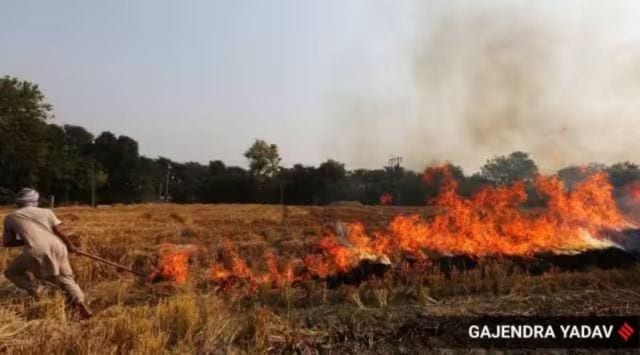Basmati harvesting begins in Punjab, so do farm fires
Only seven farm fires were reported in Punjab from September 15 to September 21 in stark contrast to the 106 fire incidents reported during the corresponding period last year.
 A Rs 350-crore action plan is in place to combat stubble-burning incidents during this Kharif season. (Express file photo)
A Rs 350-crore action plan is in place to combat stubble-burning incidents during this Kharif season. (Express file photo) In what could be seen as a minor respite to stubble burning issue and the resultant air pollution, Punjab has recorded a steep decline in the number of field fires as the harvest season for the early and shorter variety of Basmati rice, Pusa 1509, has begun.
Only seven farm fires were reported in Punjab from September 15 to September 21 in stark contrast to the 106 fire incidents reported during the corresponding period last year. According to data from the Punjab Pollution Control Board, six out of seven field fires occurred in Amritsar, while one was reported in Hoshiarpur.
Experts say that though Punjab government has taken significant measures to curb stubble burning, the real challenge lies ahead during the main season next month when Paddy (non-basmati) varieties are harvested. The harvesting of the Pusa 1509 variety commences in Amritsar at the beginning of September. After the harvest, farmers in the Majha region, particularly in Amritsar and Tarn Taran districts, shift to vegetable cultivation by the third week of September. Some of the vegetable growers resort to stubble burning to prepare their fields for potato and Matar (green peas) crops.
Amritsar boasts a substantial area under Pusa1509 basmati cultivation, reported all six field fire incidents on September 16, a notable decrease from the previous year’s 90 during the same period.
The primary paddy harvesting season in Punjab officially begins on October 1, with September dedicated to the harvesting of early Basmati varieties like Pusa 1509 and 1847. According to estimates from the Punjab Agriculture Department (the final survey occurs after the Land Revenue Department assessment in October), 32 lakh hectares are dedicated to rice crops in the state this year, of which nearly six lakh hectares are devoted to Basmati.
Key Basmati varieties such as Pusa 1121, 1718, 1509, and 1847 are sown in Punjab, of which only Pusa 1509 and 1847 varieties are harvested in September, and the remaining two are harvested in October. These two varieties make up around 40% of the total Basmati cultivation area.
The government has already distributed over 1.17 lakh Crop Residue Management (CRM) machines as of last year. This harvesting season, an additional 20,000 machines will be distributed, capable of managing nearly 100% of the state’s rice area. However, small, marginal, and semi-medium farmers require financial support to operate these machines effectively. In every district, officials from various departments are actively involved in stubble-burning control efforts this year.
A Rs 350-crore action plan is in place to combat stubble-burning incidents during this Kharif season. The Union government will contribute Rs 210 crore, with the state government contributing Rs 140 crore. Moreover, the government plans to set up 1,000 Custom Hiring Centres (CHCs) to further support CRM efforts.
Punjab produces over 20 million tonnes of paddy straw annually, with 12 million tonnes being managed through in-situ and ex-situ management methods. This year, the government aims to manage approximately 15 million tonnes of stubble, including 11.50 million tonnes through ex-situ management and 3.54 million tonnes through in-situ management. In-situ management involves incorporating stubble into the soil using CRM machines, while ex-situ management involves collecting stubble from fields and supplying it to stubble-based industries.
A senior agriculture officer in Doaba emphasised the importance of both farmers and the government playing a crucial role in fire control. He highlighted the need for government monitoring of individual farmers, especially small and marginal ones, to ensure machine usage and urged farmers to refrain from burning stubble, citing its detrimental effects on human health, environment, soil, and air quality. He also stressed that those who can afford machines must refrain from burning stubble, while those who cannot should receive support from both the government and the community within the village. As it is a collective work of the society and everyone should support in controlling the fires, he said.







